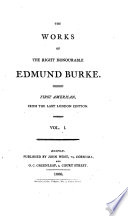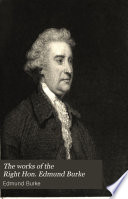 | Edmund Burke - 1889 - 556 pages
...from our natural constitution, which Providence has framed in such a manner as to find either pleasure or delight, according to the nature of the object, in whatever regards the purpoajs of our being. It ja by imitation far more than by precept, that we learn everything ; and... | |
 | Freeman of Dublin - 1800 - 674 pages
...and in whatever belongs to imitation merely as it is fuch, without any intervention of the reafoning faculty ; but folely from our natural conftitution,...pleafure or delight, according to the nature of the objeft, in whatever regards the purpofes of our being. It is by imitation, far more than by precept,... | |
 | Edmund Burke - 1806 - 522 pages
...from our natural constitution, which Providence has framed in such a manner as to find either pleasure or delight, according to the nature of the object, in whatever regards the purposes of our being. It is by imitation far more than by precept, that we learn every thing ; and... | |
 | Edmund Burke - 1823 - 446 pages
...either pleasure or delight, according to the nature of the object, in whatever regards the purposes of our being. It is by imitation, far more than by precept, that we learn everything ; and what we learn. thus, we acquire not only more effectually, but more pleasantly. This... | |
 | Dugald Stewart - 1827 - 414 pages
...whatever belongs to imitation, merely as it is such, " without any intervention of the reasoning faculty. It is by imitation, far more " than by precept, that we learn every thing. This forms our manners, our opin" ions, our lives. Herein it is that painting, and many other agreeable... | |
 | Edmund Burke - 1827 - 194 pages
...from our natural constitution, which Providence has framed in such a manner as to find either pleasure or delight, according to the nature of the object, in whatever regards the purposes of our being. It is by imitation, far more than by precept, that we learn every thing ; and... | |
 | Thomas Curtis - 1829 - 804 pages
...behaviour. Ayliffe. It was to thee, great Stagyrite, unknown, And thy preceptor of divine renown. Btackmore. It is by imitation, far more than by precept, that...learn thus, we acquire not only more effectually, buLmore pleasantly. Burke on the Sublime. PRECESSION OF THE EQUINOXES. PRECESSION OF THE EQUINOXES.... | |
 | Dugald Stewart - 1829 - 524 pages
...whatever belongs to imitation, merely as it is such, without any intervention of the reasoning faculty. It is by imitation far more than by precept, that we learn every thing. This forms our manners, our opinions, our lives. Herein it is that painting, and many other agreeable... | |
 | Edmund Burke - 1834 - 744 pages
...from our natural constitution, which Providence has framed in such a manner as to find either pleasure or delight, according to the nature of the object, in whatever regards the purposes of our being. It is by imitation far more than by precept, that we learn every thing ; and... | |
 | Edmund Burke - 1835 - 652 pages
...from our natural constitution, which Providence has framed in such a manner as to find either pleasure be all, the thing is innocent. If government were a matter of will upon a purposes of our being. It is by imitation far more than by precept, that we learn every thing ; and... | |
| |